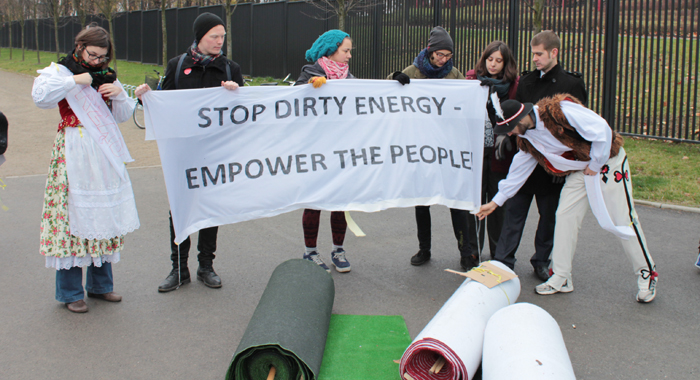
By Kenton X. Chance
WARSAW, Poland — St. Kitts and Nevis has told the global climate talks here that the twin-island federation is particularly concerned about the present and future implications of climate change for health, infrastructure, water security, and food and nutrition security.
“… climate change is the greatest global challenge of our time. It is of significant concern to us that while we continue to negotiate a global agreement, emissions continue to rise to record levels.
“St. Kitts and Nevis joins other small island developing states, in calling for urgent and ambitious action,” Delano Bart, Q.C., Basseterre’s Ambassador to the United Nations told the high level segment of the talks on Thursday.
He said that this country — which he noted has a population of fewer than 50,000 people and a landmass of 105 square miles, with the majority of settlements based on the coasts — is among those most vulnerable to the adverse effects of climate change.
Bart cited this year’s Intergovernmental Panel on Climate Change (IPCC) report, which “underscores the gravity of the challenges we face”.
He quoted the report, saying, “Continued emissions of greenhouse gases will cause further warming and changes in all components of the climate system. Limiting climate change will require substantial and sustained reductions of greenhouse gas emissions.”
He said there is a clear understanding that the “stakes have risen and that the global community needs to pool its collective will to galvanize the necessary action to address this challenge.
“It is also clear to us that the solution rests in multilateralism. Our effectiveness here in the UNFCCC (United Nations Framework Convention on Climate Change) process is a true test of its continued validity. I say to you, as states, we all have a role to play.”
“We are at a critical point in these negotiations,” he said on the day when non-governmental organisations walked out of the talks, saying they were forced to take this action because of “the failure of governments to take these talks seriously”.
“It is evident that the will of a number of parties is diminishing. I can confidently declare that this is not the case for St. Kitts and Nevis, and other forward-looking parties,” Bart, however, said.
He said one day before the official end of the summit, work remained to be done in creating “a clear, balanced and feasible path to achieving a legally binding agreement in 2015. We need to increase ambition and scale up financing,” he said.
The 190 Parties to the talk have agreed to sign a binding agreement during the 2015 summit in Paris, France.
“We appeal for the urgent operationalization and capitalisation of the Green Climate Fund. Financing for the Adaptation Fund must also be addressed. Progress in these areas, will greatly contribute towards important support for adaptation and mitigation actions into the future,” Bart said.
The purpose of the Green Climate Fund is to make a significant and ambitious contribution to the global efforts towards attaining the goals set by the international community to combat climate change.
The Adaptation Fund finances projects and programmes to help developing countries adapt to the negative effects of climate change.
Bart called for support of a proposal by the Alliance of Small Island States (AOSIS) under its position that small island developing states cannot wait until 2020 for an agreement.
He said the proposal represents an important tool in urgently addressing the pre-2020 mitigation ambitions gap, with initial focus on energy efficiency and renewable energy.
“Parties should rise to the occasion to advance the issue of Loss and Damage [that result from climate change]. This relates to the effects of climate change that cannot be addressed through adaptation or mitigation. The mandate we received in Doha must not be ignored. Let us move forward in addressing the institutional arrangements and financial support,” Bart said.
“Mr. President, we call for successful outcomes on these issues here in Warsaw. We have too much at stake. The survival of the way of life, livelihoods, prospects and progress of our peoples, and future generations depend on us. Let us not fail where it is essential for us to succeed,” Bart said.
The 19th Conference of the Parties to the UNFCCC (COP 19) and the 9th Session of the Conference of Parties serving as the Meeting of the Parties to the Kyoto Protocol (CMP 9) began on November 11 and is scheduled to end today, Friday.





